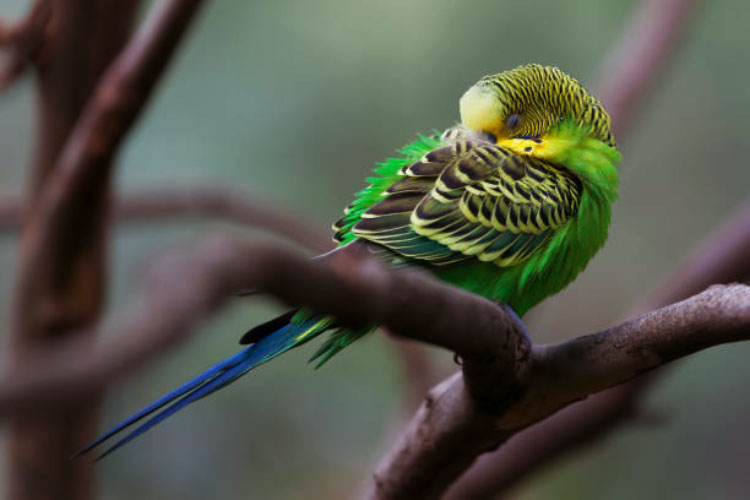If you’re worried that your budgie is napping a lot, this guide is for you. Budgies are generally active birds and it’s uncommon for them to sleep excessively at odd times of the day. So, what could be causing this behavior?
Budgie sleeping a lot may be an early sign of an underlying illness. It could also be due to old age, stress, lack of sleep at night, or molting in young budgies. Also, your budgie could sleep more when it gets cold outside in winter to help conserve energy.
The following article shares full details on why your budgie is sleeping too much and what you should do to help your budgie resume its normal sleeping patterns.
Why is your budgie sleeping a lot?
Here are the most common causes of your budgie sleeping a lot:
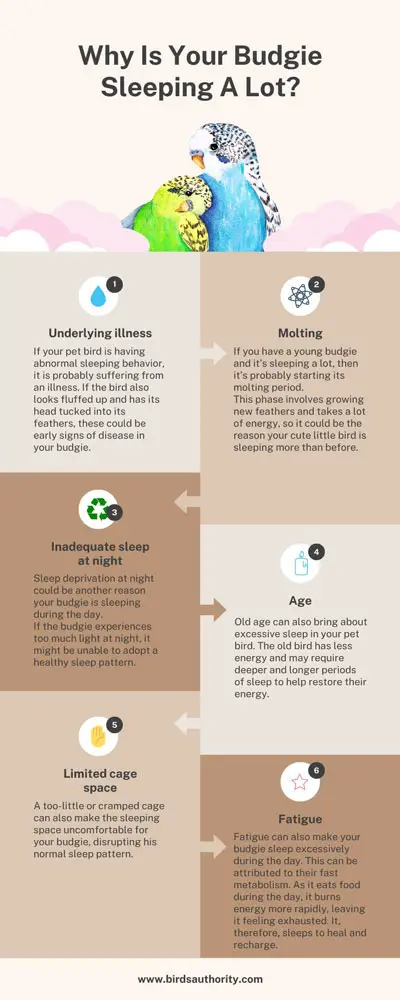
Underlying illness
If your pet bird is having abnormal sleeping behavior, it is probably suffering from an illness. If the bird also looks fluffed up and has its head tucked into its feathers, these could be early signs of disease in your budgie.
You should look out for more signs of illnesses in your bird such as diarrhea, a decrease in activity, loss of appetite, change in its bowel habits, bloody vomiting, watery eyes, and other odd behaviors, etc.
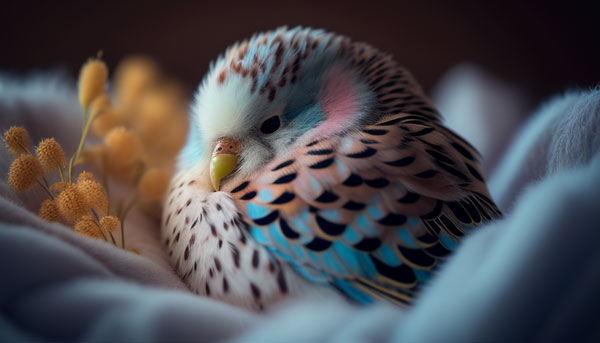
In case of any of these additional, symptoms, we advise you to take your budgie to an avian vet immediately for proper examination and treatment.
Molting
If you have a young budgie and it’s sleeping a lot, then it’s probably starting its molting period.
This phase involves growing new feathers and takes a lot of energy, so it could be the reason your cute little bird is sleeping more than before.
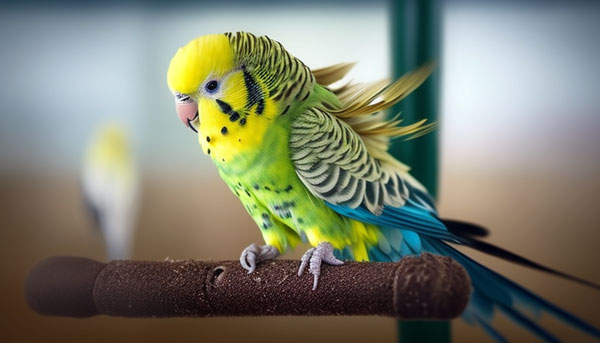
Inadequate sleep at night
Sleep deprivation at night could be another reason your budgie is sleeping during the day.
If the budgie experiences too much light at night, it might be unable to adopt a healthy sleep pattern. As a result, you’ll find it seeping during the day.
Too much noise can disrupt your budgie’s sleep at night. Low temperatures may also disrupt the budgie’s sleeping pattern.
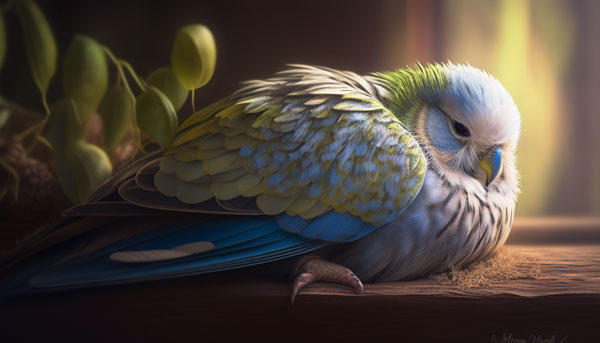
Age
Old age can also bring about excessive sleep in your pet bird. The old bird has less energy and may require deeper and longer periods of sleep to help restore their energy. (Source).
Limited cage space
A too-little or cramped cage can also make the sleeping space uncomfortable for your budgie, disrupting his normal sleep pattern.
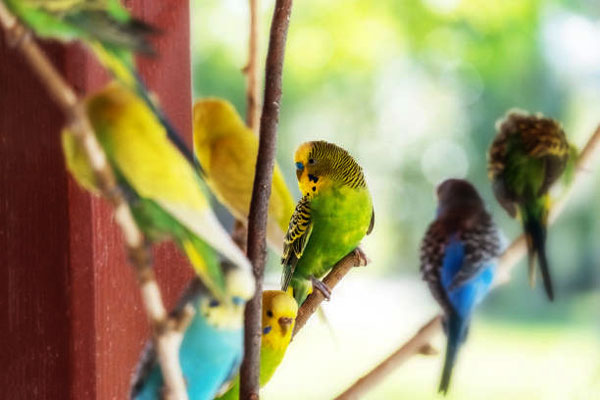
Fatigue
Fatigue can also make your budgie sleep excessively during the day. This can be attributed to their fast metabolism. As it eats food during the day, it burns energy more rapidly, leaving it feeling exhausted. It, therefore, sleeps to heal and recharge.
How much sleep does a budgie need?
Budgies usually require about 10 to 12 hours of deep sleep a night without any disruptions in addition to a few catnaps during the day.
Most pet budgies tend to retain a similar sleeping pattern as wild budgies by sleeping around 6pm. And most of them will be deep asleep by around 7 to 7.30 pm.
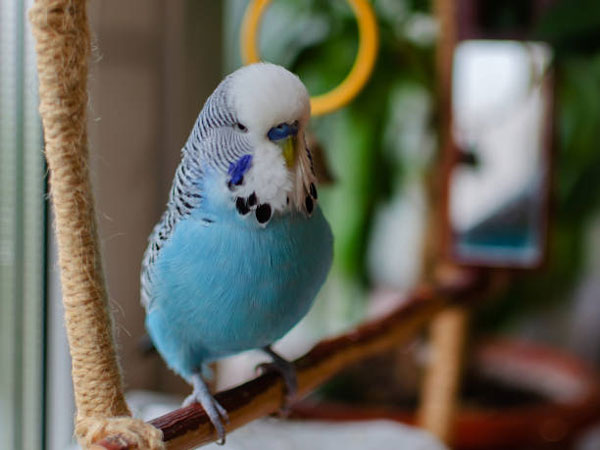
But if you notice your budgie starting to sleep during odd hours of the day, around the time it used to be active before, then you need to get concerned.
You may want to check if your budgie getting old could be the reason behind its abnormal sleeping pattern. Inspect the bird for injuries or signs of illnesses.
Seek veterinary help to find out what’s going on with your feathered friend.
What are the signs of a healthy sleep pattern in a budgie?
As we’ve discussed in the previous section, budgies require a long night of sleep.
But if they don’t get enough sleep or if not provided with a comfortable and peaceful environment for sleeping, they may start behaving differently.
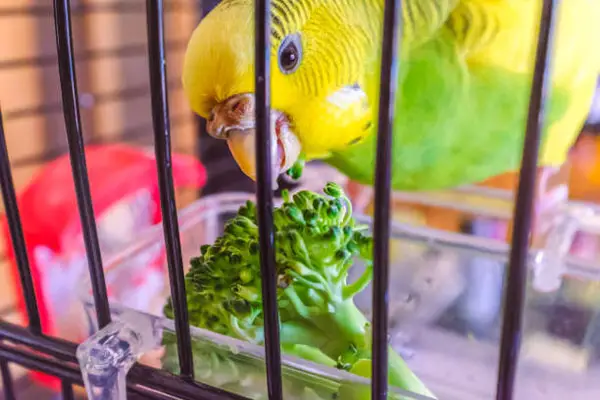
If you want to know whether your budgie has a healthy sleep pattern, then it shouldn’t be sleeping too much during the day. It should also not show a change in its normal behavior.
Abnormal behavior typical of budgies that are sleep-deprived include:
- Lethargy
- Sleeping with the eyes half-closed
- Increased crankiness and aggressiveness
- Excessive brooding instinct, and
- Change in bowel habits.
Insufficient sleep can also cause your budgies to start lashing out at one another, to a point of inflicting minor injuries.
If your budgies suddenly become hostile to each other, you may want to check if they’re getting enough sleep.
Why comfortable and peaceful sleeping environment is necessary for budgies
You should provide your budgie with a peaceful and comfortable environment for your budgie to enjoy a sleep of 10 to 12 hours a night.
If your pet bird doesn’t have an environment that promotes healthy sleeping, then it will develop a weaker immune system which makes it easily vulnerable to various diseases.
A night of good sleep also helps with your budgie’s healthy brain, maintains a healthy weight, reduces stress levels, ensures positive moods, keeps away various illnesses, etc.
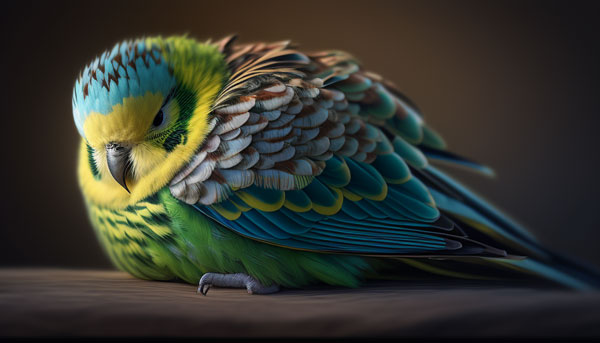
Here are some quick tips for providing your budgie with a comfortable sleeping space:
- Provide your budgie with comfortable sleeping perches inside their cage. Budgies love sleeping on perches. Make sure you have a perch for every bird in the cage.
- Budgies like clean living spaces, so keeping their environment tidy can positively influence their sleeping behaviors.
- Create and stick to a regular sleep routine for your budgies. If possible, make the routine mimic budgies’ natural cycle
- Ensure lights go out for your budgies to prepare them for a long night’s sleep just like the wild budgies use the gradual fading of sunlight to prepare for sleep.
- Ensure the sleeping environment has comfortable temperatures of around 70 to 80 degrees F. If the room gets too cold or too hot, it becomes uncomfortable for your budgie to sleep, triggering insomnia.
- Keep the place quiet by eliminating any auditory and visual disruptions, such as TV. Noise can easily startle budgies and keep them awake while they should be sleeping.
Should I take my budgie to the veterinary if it sleeps too much?
If your budgie is sleeping more than usual and you suspect it could be due to an underlying medical condition, then you should take it to the vet.
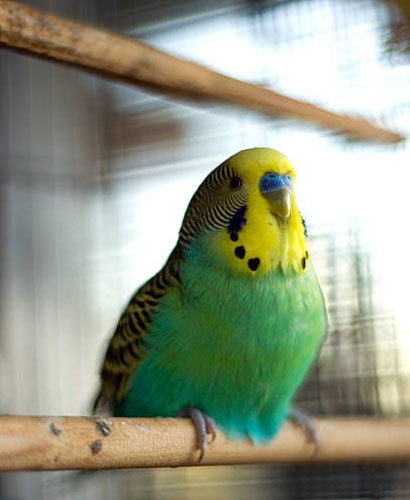
If you have found additional symptoms in your budgie that point out the possibility of a disease, then it’s further confirmation that you need to take your budgie to an avian vet.
The vet will properly examine your budgie to see if it’s ill and recommend the best treatment options.
Final Verdict
Your budgie sleeping excessively during the day should make you concerned as it’s against its normal sleeping behavior. The amount of sleep needed by an average budgie is 10 to 12 hours at night and a bird that gets enough sleep shouldn’t sleep during the day. Possible causes of sleeping during the day include underlying illness, sleep deprivation, old age, stress, and molting chicks.
Poor sleep patterns can weaken your budgie’s immune system and lead to a whole lot of abnormal behaviors. So, make sure your budgie has a comfortable sleeping environment. Eliminate all triggers of insomnia in your budgie’s cage including too much light, and noise, and maintain proper sleeping temperatures. A budgie that sleeps well at night stays happy and healthy!
